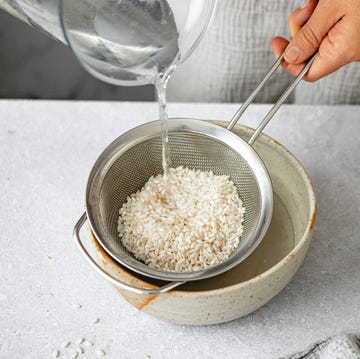Once winter rolls around, many of us find ourselves spending more time indoors, bundled up in cozy blankets, sipping hot drinks, and avoiding the cold at all costs. While it’s tempting to hibernate until spring, there's one sneaky side effect of staying inside all winter long: vitamin D deficiency. Known as the "sunshine vitamin," this nutrient is crucial for keeping our bones strong, our immune systems robust, and our moods lifted.
But with shorter days and overcast skies, how do you make sure you're getting enough vitamin D in the winter? Well, we've gathered top-notch tips from Registered Dietitian and nutritionist Stefania Manetti (My Vita Sana LLC) so that your vitamin D levels don't take a nosedive during the colder seasons. By taking advantage of sunny days, being mindful of your diet, and perhaps supplementing when necessary, you can keep your body’s "sunshine" levels in check throughout the year.
But, according to Manetti, vitamin D "is a fat-soluble vitamin naturally present in very few foods." So, when the sun isn't on your side, you have to know which foods and supplements to reach for—without overdoing it! Read on for expert advice on getting the right dose of vitamin D during the winter months.
What Is Vitamin D?
Vitamin D is an essential nutrient needed for you to stay happy and healthy. According to Manetti, it's "produced by the body when our skin is exposed to the sun." So, anytime you're standing in the sun's rays, your body is quite literally soaking up the sun, then using it to get vitamin D. This happens when "UV rays convert a substance on our skin called 7-dehydrocholesterol into vitamin D. In order for vitamin D to do its job, it needs to be transformed into active vitamin D by the liver and the kidneys," says Manetti.
How Much Vitamin D Do You Need?
Just like any other vitamin, you want to be sure you're getting enough Vitamin D, but you also don't want too much. You know what they say: It is possible to have too much of a good thing! In this case, "In excess it can become toxic," says Manetti. She adds, "Since it is a fat soluble vitamin, the excess is stored in the fat and can also cause health problems."
The following are her recommended daily amounts of vitamin D:
- For individuals 1 through 70: 15 mcg of vitamin D per day (600 IU)
- For individuals 71 and older: 20 mcg of vitamin D per day (800 IU)
Manetti notes that IU is "Often the unit used on supplements." Additionally, she says, "These amounts assume that there is no vitamin D deficiency and that the body can absorb and activate vitamin D efficiently."
Why Vitamin D Is Important
Vitamin D is essential to both your physical and mental health for several reasons. The multitasking nutrient keeps your body in balance and without it, you could be at risk for a multitude of health problems. From strengthening your bones and muscles to warding off chronic diseases and depression, vitamin D is definitely desired. Specifically, it's "needed to absorb calcium and maintain strong bones and teeth," says Manetti. "Research is uncovering many more roles of vitamin D which is involved in a multitude of processes, from reducing inflammation and supporting the immune system, to glucose metabolism and even mood regulation."
How to Get Vitamin D in the Winter Without the Sun?
So, you need vitamin D to stay healthy, but what do you do during the winter months when clouds are all t0o common? Well, luckily, there are a few ways to get your fix without the sun's rays. In fact, you can add to your diet to get a dose of vitamin D. According to Manetti, "Food sources of vitamin D include fatty fish (e.g., trout, salmon, tuna, mackerel), beef liver, egg yolks, and high fat dairy products." She adds, "Because natural food sources are limited and most people do not spend enough time in the sun, many foods are fortified or enriched with vitamin D, from cow's milk, to non-dairy milk, and even some types of orange juice and cereals."
In some cases, if your menu just isn't cutting it, you might need to take a supplement as well—especially during the winter. Manetti advises, "Supplements are sometimes necessary to maintain optimal levels of vitamin D. Although these can be purchased over the counter, even at a very high dosage, it is best to as your medical provider to test your actual vitamin D levels so they can recommend the best dosage for you. It is important not to over supplement vitamin D."
The Signs of Vitamin D Deficiency
Vitamin D deficiency is a pretty common problem for people year-round—and that deficit only increases in the winter. Be sure to stay on top of your doctor visits to ensure you're always getting all the vitamins you need. Manetti says, "The signs of vitamin D deficiency are not easy to spot in the early stages, so it is best to have your levels checked by blood work." She also notes, "It is also a good idea to check your vitamin D levels to rule out any deficiency if you have digestive problems preventing nutrient absorptions. Your health care provider will be able to advise you on the best strategy to check whether your levels are optimal."
So, don't let the shorter days get you (and your vitamin D levels) down! With expert advice and several ways to aid in your vitamin D intake, you can stay happy and healthy until the springtime sun returns.
Macie Reynolds is the assistant editor of E-Commerce and SEO for The Pioneer Woman.














